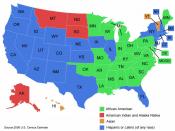The word 'prejudice' derives from the Latin word pre-judicium. Literally it means 'pre-judgment'. In Rome, laws were different for the upper class, the patricians, and for the lower class, the plebeians. The 'pre-judgment' was a judicial examination, held prior to the real trial, to determine first the social status of would-be litigants. Often it meant that, in fact, long before the actual trial, the outcome was established by the 'prejudice'. (Young, 1946)
Today's meaning of prejudice comes close to this. Without examining a person on his or her own merit, we have already adopted a negative attitude that implies a judgment. A prejudice is a mixture of beliefs and feelings that predisposes people to respond negatively to members of a particular group.
'Prejudice is an emotional, rigid attitude. It leads one to select certain facts for emphasis, blinding one to other facts. It causes one to look on all members of a 'group' as if they were alike'.
(Simpson and Yinger, 1972)
'Prejudice is an aversive or hostile attitude towards a person who belongs to a group, simply because he or she belongs to that group, and is therefore presumed to have the objectionable qualities ascribed to that group. It is an antipathy based on a faulty and inflexible generalisation.' (Allport, 1954)
'Social prejudice is a negative, hostile, rigid and emotional attitude towards a person simply because he or she is perceived to belong to a group, and is presumed to possess the negative qualities ascribed to the group as a result of selective, obsolete or faulty evidence.' (MacGriel, 1977)
Prejudice is defined as a positive or negative attitude based on information or knowledge that is either illogical, unrelated to reality, or a distortion of fact, and that is unjustifiably generalized to all the members of a group.



Very good
This essays gives detailed information on prejudice and the harm of it, this is a good essay, and well written.
4 out of 4 people found this comment useful.